US naming trends and analysis, using datasets from the Social Security Administration
Don't wanna be here? Send us removal request.
Text
Top gender-neutral names given to 2023 babies, per US SSA data
These are the most-used gender-neutral names given to babies born in 2023.
#unisex names#gender-neutral names#gender neutral names#unisex#gender-neutral#gender neutral#names#naming#name trends#naming trends#name popularity#name data#names data#ssa name data#ssa names data#ssa baby name data#ssa baby names data#social security administration name data#social security administration names data#social security administration baby name data#social security administration baby names data#social security administration data#blog:link#blog:link:docs.google.com
0 notes
Text
Top gender-neutral names given to 2022 babies, per US SSA data
These are the most-used gender-neutral names given to babies born in 2022.
#unisex names#gender-neutral names#gender neutral names#unisex#gender-neutral#gender neutral#names#naming#name trends#naming trends#name popularity#name data#names data#ssa name data#ssa names data#ssa baby name data#ssa baby names data#social security administration name data#social security administration names data#social security administration baby name data#social security administration baby names data#social security administration data#blog:link#blog:link:docs.google.com
0 notes
Text
The Rise of the Aidens: given names ending in -aiden/aydin/etc.
According to data from the US Social Security Administration, such names peaked in and around 2008.

Regex pattern: "(a[iye]+|.+a[iye]?)d[eaioyu]n$"
The above graph includes some 382 names. By total number, the top 30 are:
Jayden, Aiden, Hayden, Brayden, Aidan, Jaden, Ayden, Kayden, Caden, Kaden, Kaiden, Braden, Cayden, Jaiden, Zayden, Caiden, Jadyn, Braydon, Braeden, Raiden, Jadon, Zaiden, Jaydon, Jaidyn, Braiden, Aydan, Aydin, Jaeden, Rayden, and Haiden
#name frequency#regex#names#naming#name trends#naming trends#name popularity#name data#names data#ssa name data#ssa names data#ssa baby name data#ssa baby names data#social security administration name data#social security administration names data#social security administration baby name data#social security administration baby names data#social security administration data
0 notes
Text
Letters X, Y, & Z -- are they becoming more common in US names?
Mostly, yes--and the trend remains even when we weight by the number of usages.
It's important to weight by the number of usages because we want to consider the number of babies actually given each name.
Letter Z shows the most consistent trend:
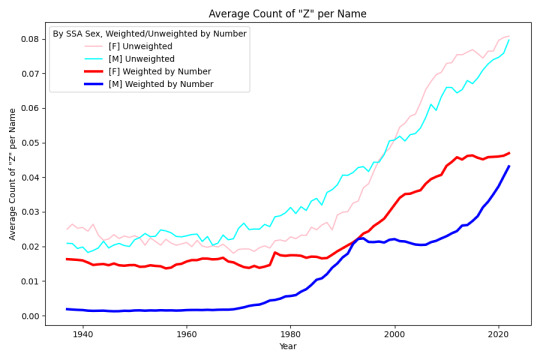
Letters X and Y have increased in frequency, too, but the trend is reversing in recent years.
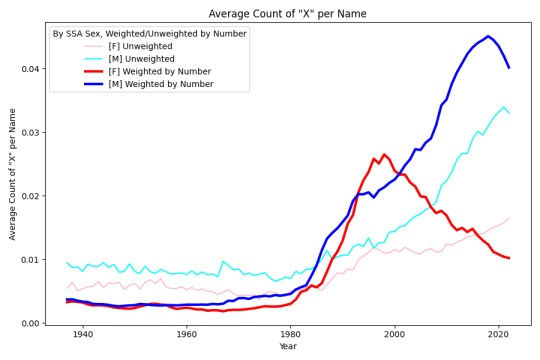

#scrabble#tragedeigh#letter frequency#names#naming#name trends#naming trends#name popularity#name data#names data#ssa name data#ssa names data#ssa baby name data#ssa baby names data#social security administration name data#social security administration names data#social security administration baby name data#social security administration baby names data#social security administration data
0 notes
Text
Average Scrabble score of US names, weighted by usage
The average Scrabble score is increasing, but the trend falls apart when we weight by the number of usages.
It's important to weight by the number of usages because we want to consider the number of babies actually given each name.
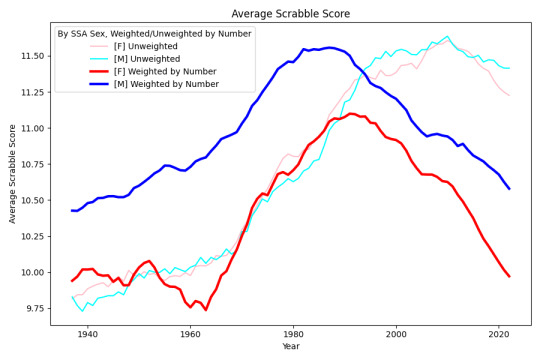
Scrabble points from here:
1 point: E, A, I, O, N, R, T, L, S, U 2 points: D, G 3 points: B, C, M, P 4 points: F, H, V, W, Y 5 points: K 8 points: J, X 10 points: Q, Z
#scrabble#tragedeigh#names#naming#name trends#naming trends#name popularity#name data#names data#ssa name data#ssa names data#ssa baby name data#ssa baby names data#social security administration name data#social security administration names data#social security administration baby name data#social security administration baby names data#social security administration data#blog:link#blog:link:wikipedia.org
0 notes
Text
More American kids are being given unisex names, regardless of birth sex.

Unisex/gender-neutral names can be categorized as follows:
Narrowly unisex names: used for each SSA sex at least 30% of the time.
Broadly unisex names: used for each SSA sex at least 20% of the time.
Technically unisex names: used for each SSA sex at least 10% of the time.
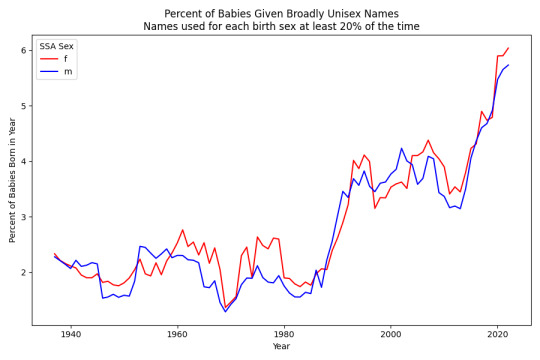
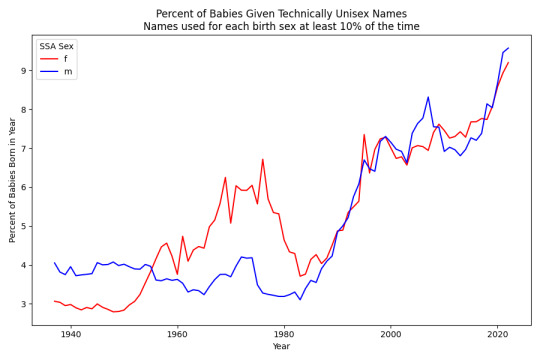
#unisex names#gender-neutral names#gender neutral names#unisex#gender-neutral#gender neutral#names#naming#name trends#naming trends#name popularity#name data#names data#ssa name data#ssa names data#ssa baby name data#ssa baby names data#social security administration name data#social security administration names data#social security administration baby name data#social security administration baby names data#social security administration data
4 notes
·
View notes
Text
Top unisex names of the 1990s: where are they now?

The below two plots show the top 20 unisex/gender-neutral names of the 1990s, based on total usages from 1990-9. You can see the gender trend (F% share) post-1999, split into two plots for better visibility.
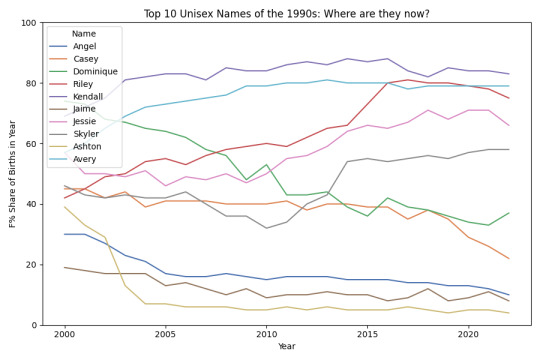
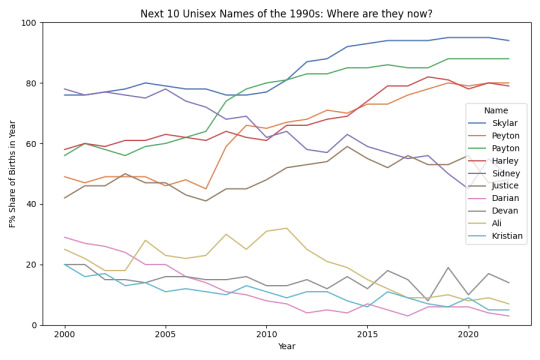
#gender-neutral#unisex#drift of unisex names#unisex names#gender-neutral names#neutral names#social security administration#social security administration name data#social security administration data#ssa name data#ssa data#name data#names data#naming data#names#naming#naming trends#name trends
0 notes
Text
Top unisex names of the 1970s: where are they now?

The below two plots show the top 20 unisex/gender-neutral names of the 1970s, based on total usages from 1970-9. You can see the gender trend (F% share) post-1979, split into two plots for better visibility.
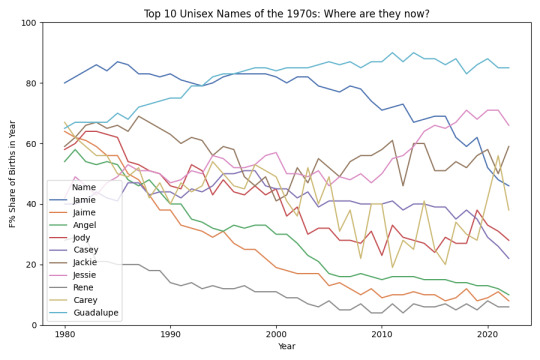
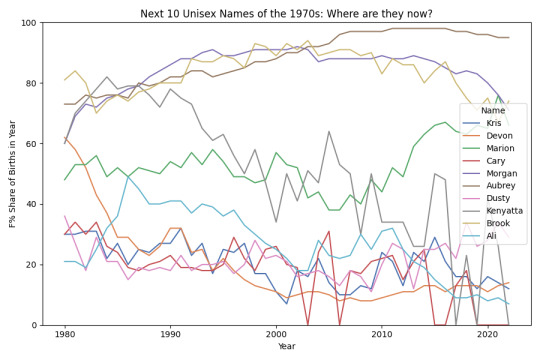
#gender-neutral#unisex#drift of unisex names#unisex names#gender-neutral names#neutral names#social security administration#social security administration name data#social security administration data#ssa name data#ssa data#name data#names data#naming data#names#naming#naming trends#name trends
0 notes
Text
Top unisex names of the 1980s: where are they now?
The below two plots show the top 20 unisex/gender-neutral names of the 1980s, based on total usages from 1980-9. You can see the gender trend (F% share) post-1989, split into two plots for better visibility.
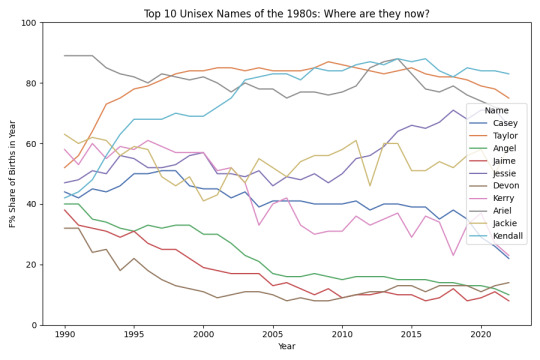

These once-unisex names have sometimes remained gender-neutral. They haven't consistently "gone to the girls" as often alleged; neither have they consistently trended in a masculine direction.
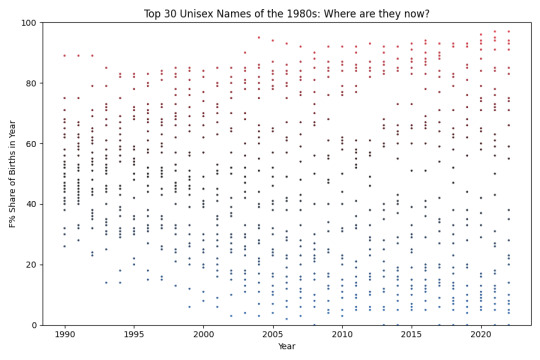
#gender-neutral#unisex#drift of unisex names#unisex names#gender-neutral names#neutral names#social security administration#social security administration name data#social security administration data#ssa name data#ssa data#name data#names data#naming data#names#naming#naming trends#name trends
0 notes
Text
The top masculine names account for a larger percent of babies.
Using SSA sex, the male ranking is more saturated than the female ranking.
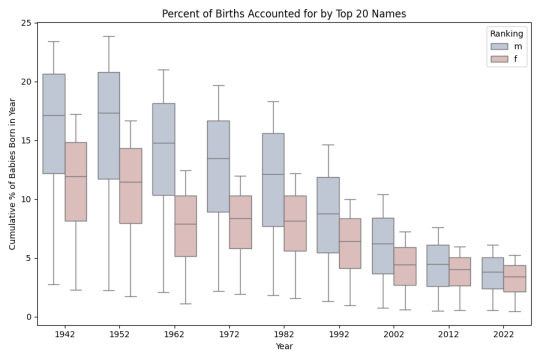
The pattern holds when looking at the top 100 and top 1000 names.

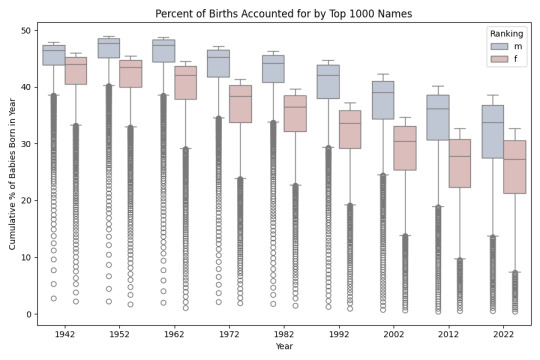
The SSA dataset contains increasingly many unique names under both F and M rankings. Each year, the F ranking contains more unique names than the M ranking.
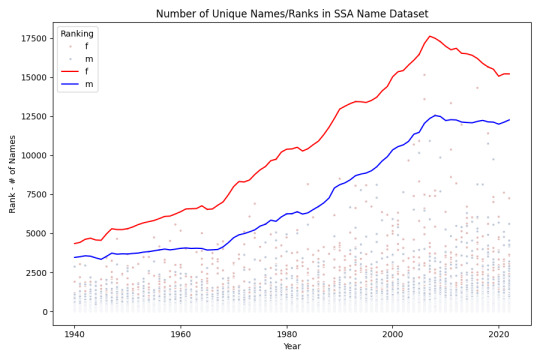
#name desaturation#name diversification#name rank asymmetry#name rank#name ranking#names rank#names ranking#social security administration#social security administration name data#social security administration data#ssa name data#ssa data#name data#names data#naming data#names#naming#naming trends#name trends
0 notes
Text
More and more uncommon names are excluded from the SSA name dataset.
For privacy reasons, the SSA name dataset excludes very uncommon names.
The graph below shows the percent of Social Security card applicants that have been excluded from the SSA name dataset each year.
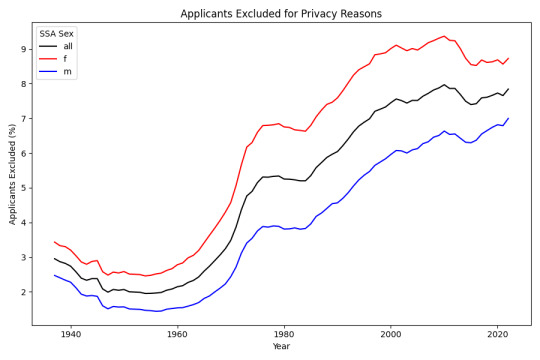
Per the stated limitations of the SSA name dataset:
To safeguard privacy, we exclude from our tabulated lists of names those that would indicate, or would allow the ability to determine, names with fewer than 5 occurrences in any geographic area. If a name has less than 5 occurrences for a year of birth in any state, the sum of the state counts for that year will be less than the national count.
The SSA also publishes a table with the number of Social Security card applicants by year. This table contains total numbers and not specific names, so applicants with very uncommon names are accounted for in this table. Each year, there is a gap between the number of Social Security card applicants and the number of births accounted for in the SSA name dataset.
#uncommon names#ssa applicants#ssa applications#privacy#name desaturation#name diversification#social security administration#social security administration name data#social security administration data#ssa name data#ssa data#name data#names data#naming data#names#naming#naming trends#name trends#blog:link#blog:link:ssa.gov
0 notes
Text
SSA datasets & caveats
Datasets from the United States Social Security Administration are available on SSA.gov.
- Beyond the Top 1000 Names: national, state-level, and territory-level data ^ Some important background and limitations
- Number of Social Security card applicants by year
- Actuarial Tables
#ssa datasets#social security administration datasets#datasets#caveats#actuarial#names#naming#name trends#naming trends#name popularity#name data#names data#ssa name data#ssa names data#ssa baby name data#ssa baby names data#social security administration name data#social security administration names data#social security administration baby name data#social security administration baby names data#social security administration data#blog:link#blog:link:ssa.gov
0 notes
Text
American kids are being given more names than ever before.

Cumulatively, the top 100 names account for about 25% of babies born in recent years, versus almost 60% in the mid-1900s.
Even the top 1000 names have desaturated considerably. In the mid-1900s, over 90% of babies were accounted for by the top 1000 names. In recent years, the top 1000 names account for less than 70% of babies.
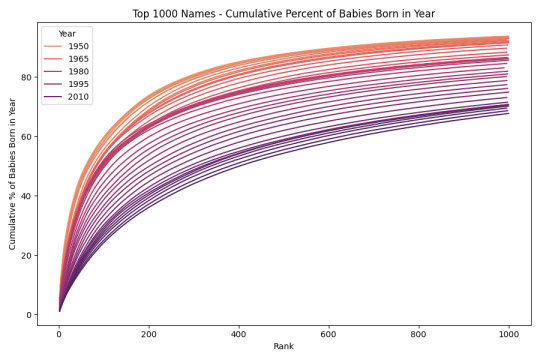
#name desaturation#name diversification#name rank#name ranking#names rank#names ranking#social security administration#social security administration name data#social security administration data#ssa name data#ssa data#name data#names data#naming data#names#naming#naming trends#name trends
0 notes
Text
Each rank accounts for a smaller percent of babies than it did in decades past.
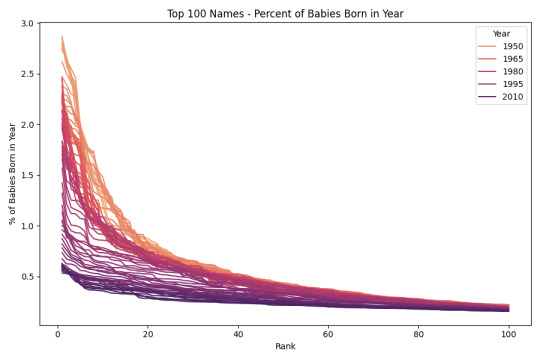
In the mid-1900s, the top-ranked name accounted for nearly 3% of all babies born in the US. In recent years, the top-ranked name accounted for about 0.6% of all babies born in the US.
#name desaturation#name diversification#name rank#name ranking#names rank#names ranking#social security administration#social security administration name data#social security administration data#ssa name data#ssa data#name data#names data#naming data#names#naming#naming trends#name trends
0 notes
Text
Ranks are falling faster than in previous decades.
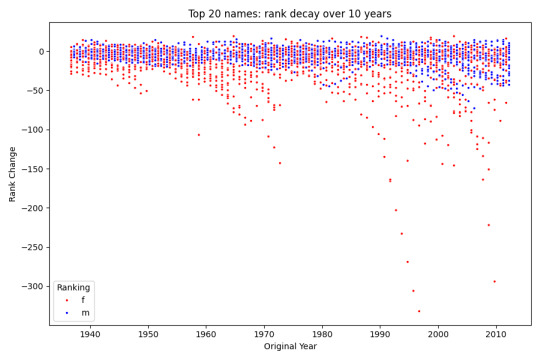
The top names of recent years are more quickly falling in rank and potentially exiting the top 20/100.


#name desaturation#name diversification#name rank#name ranking#names rank#names ranking#social security administration#social security administration name data#social security administration data#ssa name data#ssa data#name data#names data#naming data#names#naming#naming trends#name trends
0 notes
Text
Trend of popular gender-neutral names since 1940 -- have they "gone to the girls"?
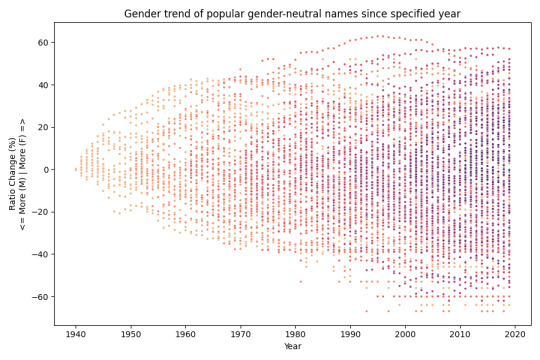
Analysis of the US Social Security Administration name dataset shows that, on the whole, gender-neutral names haven't "gone to the girls". Instead, the data indicates they've drifted masculine as often as they've drifted feminine.
A cutoff year of 1940 was chosen because the SSA dataset is less reliable before that time.
#unisex#gender-neutral#drift of unisex names#unisex names#gender-neutral names#neutral names#social security administration#social security administration name data#social security administration data#ssa name data#ssa data#name data#names data#naming data#names#naming#naming trends#name trends
0 notes